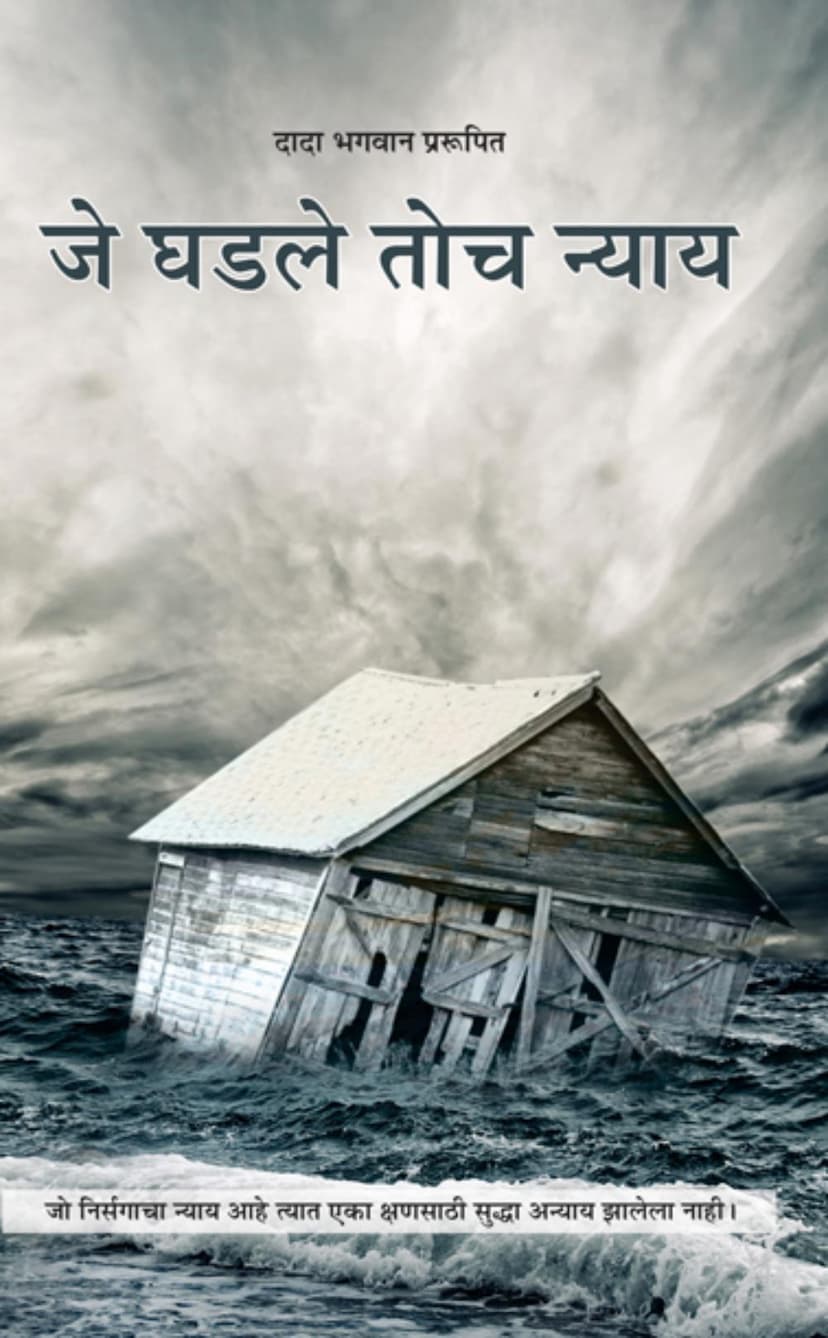Je Ghadle Toch Nyay
Added to library: September 2, 2025

Summary
Here's a comprehensive summary of the Jain text "Je Ghadle Toch Nyay" (Whatever Happened is Justice) by Dada Bhagwan, based on the provided pages:
Core Philosophy: "Whatever Happened is Justice"
The central theme of the book, as propounded by Dada Bhagwan, is that "Whatever happened is justice." This profound statement forms the bedrock of the philosophy presented. It asserts that in the grand scheme of nature and the universe, there is no injustice whatsoever. Nature operates with absolute fairness, and every event, no matter how seemingly adverse or unfair to our limited human perception, is in accordance with a perfect and flawless natural law.
Nature as the Ultimate Judge
The text emphasizes that Nature itself is just and never deviates from its principles. Nature is not a person or a deity that can be influenced or can act unjustly. Instead, it is described as "scientific circumstantial evidence" – a complex interplay of causes and conditions that leads to a particular outcome. Every event is a consequence of accumulated accounts (karma) and a multitude of contributing factors.
Rejection of Human-Centric Justice
The book strongly criticizes the human tendency to seek justice in worldly affairs. It argues that the very act of searching for justice leads to disputes and conflicts. Human courts and legal systems, by their very nature, are prone to errors and subjective interpretations, unlike the unerring justice of Nature. The text suggests that dwelling on perceived injustices and seeking external justice is futile and leads to suffering.
Understanding Karma and Causality
The teachings delve into the concept of karma and causality. It states that no mosquito can bite us without a preceding account; therefore, every punishment, misfortune, or even seemingly positive event is a direct result of past actions and accumulated accounts. Understanding this principle is the key to liberation from suffering.
The Illusion of Injustice
The book addresses the common human perception of injustice, citing examples like natural disasters (earthquakes, storms), accidents, and interpersonal conflicts where one party seems to suffer while another thrives. Dada Bhagwan clarifies that these are not injustices but rather the unfolding of karmic accounts. For instance, if someone's crop is destroyed, it's a consequence of their karma, not Nature's malice.
The Role of the Intellect (Buddhi) and the Path to Liberation
The intellect (Buddhi) is identified as the primary source of our perceived suffering because it constantly seeks justice and creates conflicts. The key to liberation lies in transcending the intellect's tendency to question and judge events as just or unjust. By accepting that "whatever happened is justice," we disarm the intellect and prevent it from creating further complications.
Practical Application: Acceptance and Non-Interference
The practical application of this philosophy involves:
- Acceptance: Embracing whatever happens as just and correct.
- Non-interference: Not getting involved in disputes or trying to alter the natural course of events.
- Observation: Witnessing events as they unfold without judgment.
- Responsibility: Recognizing that all experiences are a projection of one's own past actions.
The "Akram" (Non-Sequential) Path
The text highlights Dada Bhagwan's unique spiritual path, the "Akram" or "non-sequential" path. This path allows individuals to attain self-knowledge and experience liberation in a short period, unlike traditional step-by-step spiritual journeys. This path is facilitated by an Enlightened Being (Gnani Purush) who can impart this knowledge.
The "Daada Bhagwan" Identity
The book clarifies the identity of "Daada Bhagwan." Dada Bhagwan is not the physical body of A.M. Patel, but the Divine Self residing within, which manifested fully in him. He humbly states that he bows to the Daada Bhagwan within him, who is the Lord of the fourteen worlds.
The Nature of Divine Justice vs. Worldly Justice
The text distinguishes between Nature's justice and human notions of justice. While human systems can err, Nature's justice is infallible. For example, even if a murderer is released by a court due to lack of evidence or due to their good karma, Nature's account will eventually be settled.
Examples and Analogies:
The book uses various analogies to illustrate its points, such as:
- A shopkeeper forgetting to give change.
- A farmer's crop being destroyed.
- A snake bite.
- A father giving a lesser share of land to his son.
- A bus running over someone.
In each case, the event is presented not as an injustice but as a manifestation of karma and Nature's precise accounting.
The Goal: Self-Realization and Liberation
The ultimate aim of understanding and internalizing "whatever happened is justice" is to achieve self-realization (Atma Gyana) and liberation (Moksha) from the cycle of birth and death. This understanding brings inner peace and the ability to remain undisturbed amidst life's challenges.
Key Takeaways:
- Everything that happens is governed by a perfect natural law and is therefore just.
- The intellect's search for worldly justice is the root of suffering.
- Acceptance and understanding of karma are crucial for peace and liberation.
- Dada Bhagwan's teachings offer a direct path to self-realization.
- By ceasing to search for justice, one can eliminate the intellect's confusion and attain freedom.
In essence, "Je Ghadle Toch Nyay" is a profound spiritual guide that challenges conventional notions of justice and presents a path of acceptance, understanding, and liberation through the unwavering recognition of Nature's perfect and impartial order.